Two or Three Things I Know for Sure (4 page)
Read Two or Three Things I Know for Sure Online
Authors: Dorothy Allison

BOOK: Two or Three Things I Know for Sure
12.82Mb size Format: txt, pdf, ePub

“WE COULD BE RELATED,” Lucy told me. She’d been living in Monte Rio a little longer than I had, and we’d see each other mornings when I walked down to the post office. I would sit with her on the bench under the post office window and watch the way she used her hands. She kept pushing her hair back, dark brown hair in a thick dry mass covering her neck and shoulders.
“I’m a Campbell on my granddaddy’s side,” Lucy told me proudly. “And a Gibson, I’m pretty sure, from a great-aunt I never actually met. My real name is Lillian, though people around here don’t know that. I don’t think anybody in the world knows anymore.” She stopped and stared off into the distance, as if she were looking for someone who remembered her from when she was Lillian.
“My people moved to Arkansas,” Lucy said. “I changed my name when I married P.J. He didn’t like Lillian.” And then she told the rest of it, how she left Arkansas at twenty-two, running away from P.J. and a load of debt. As she spoke, Lucy’s face changed, seemed to become painfully flat and hard, as if the morning sun had shifted in the sky, throwing no shadows to soften the line of brow or chin.
“Got on the Greyhound with two suitcases and a little patent leather handbag. Had me two Cokes and a fifth of Ancient Age bourbon, what P.J. called the poor man’s Jack Daniel’s. Nursed that whiskey across the whole Southwest, all the way to Arizona. But I came into Bakersfield sober, cold sober and crying. Lord damn, I think I cried straight through the first few weeks. Didn’t look back, couldn’t never look back. It was either kill the man or leave, and it wasn’t worth killing him.”
She stopped and looked around as if the change in the light had finally registered on her, too. “I’m cold,” she said. “You cold?”
She left him the furniture, the truck, and the house on a quarter acre of scrub oak. On the worked-pine dining room table his parents had given them, she left him the reason she was leaving—the hospital bill for their stillborn daughter, the one he had insisted didn’t matter.
“It wasn’t like it was a boy.”
“It wasn’t like it was a boy.”
“Son of a bitch,” she said.
“I got a problem, you know, same old same old.” She laughed a familiar bitter laugh and looked at me sideways. “But I been clean a week now, and I’m doing good. It an’t easy like people pretend, changing your life this late in. An’t easy at all.”
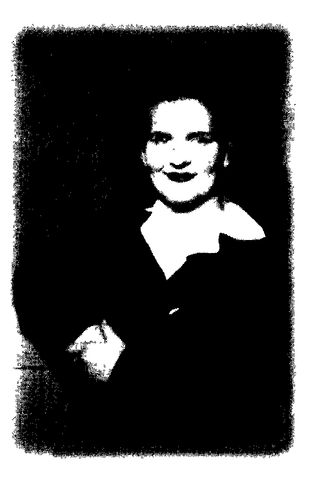
She laughed again, smoothing the fabric of her loose trousers. “Hell, though, nothing is, is it?” And I laughed with her, not reminding her of last month or the month before. Every time I run into her we have the same conversation, how she’s getting clean—working at it, anyway—and doing good, doing good until she isn’t. Then she gets drunk again and sings to the trees.
When Lucy drinks she plays records and swears if she’d just had the chance she too could have been a country star. Maybe so. Sometimes when I hear her voice in the distance, I believe her, that contralto drifting up into the redwood trees as pure and clean as her rage ever was.
Maybe we
are
related. Among my mama’s photos there was one woman with a face similar to Lucy’s, another handsome woman with a dark cloud of hair, one of my mama’s aunts, I think. But Lucy’s drawl is Barstow, not Greenville. She spent five years in Bakersfield. Now she roasts turkey stuffed with jalapeño peppers, deep-fries artichoke hearts, and loves to make a salad of sliced pineapple and avocado.
are
related. Among my mama’s photos there was one woman with a face similar to Lucy’s, another handsome woman with a dark cloud of hair, one of my mama’s aunts, I think. But Lucy’s drawl is Barstow, not Greenville. She spent five years in Bakersfield. Now she roasts turkey stuffed with jalapeño peppers, deep-fries artichoke hearts, and loves to make a salad of sliced pineapple and avocado.
“Where’d you learn to cook like this?” I asked her one afternoon.
“Family talent,” she tells me. “Just picked it up as I went along.” And she tries to get me to put a little whiskey in my fruit juice or at least have a beer to keep her company. The stories she tells then take me back three decades and would scare me sober if I let her make me drink.
My mama never told me stories. She might repeat something someone had said at work that day, or something she had said—lessons in how to talk back, stand up for myself, and tell someone off. But behind her blunt account of the day’s conversation was a mystery: the rest of her life.
Mostly my aunts respected Mama’s sense of propriety. They wouldn’t tell stories she didn’t want them to tell, nothing of my father or the husband she had loved and lost. Only my grandmother was shameless.
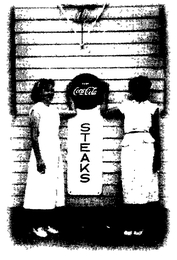
Mattie Lee Gibson would tell people anything. Sometimes she even told the truth. She was the one told me I had an uncle who killed his wife, but said she didn’t know if she believed his story about it, how he’d walked in on the woman in bed with another man. She was the one told me my mama had been married three times. My mama worked forty years as a waitress, teasing quarters out of truckers, and dimes out of hairdressers, pouring extra coffee for a nickel, or telling an almost true story for half a dollar.
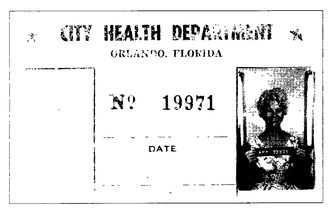
“Get them talking,” she told me when she took me to work with her. “Or just smiling. Get them to remember who you are. People who recognize you will think twice before walking away and leaving nothing by the plate.”
Mama was never confused about who she was or what she was offering across that counter. “It’s just a job. People need their lunch served with a smile and a quick hand. Don’t need to know your business—if you’re tired or sick or didn’t get any sleep for worrying. Just smile and get them what they need.”
Three bouts of cancer and half a dozen other serious illnesses—not to mention three daughters and four grandchildren who courted trouble with every turn of the moon—but few of Mama’s customers knew how stubbornly she had to put on that smile for them. She was an actress in the theater of true life, so good that no one suspected what was hidden behind the artfully applied makeup and carefully pinned hairnet.
“You should have been in the movies, like Barbara Stanwyck or Susan Hayward,” I told her once as we looked at those pictures of her as a girl.
She just shook her head. “Life an’t the movies,” she told me.
Mama always said I was tenderhearted, I trusted too easily and would have to learn things the hard way. She was right, of course, and the thing I learned was the thing she knew intuitively: the use of charm, the art of acting, the way to turn misery into something people find understandable or sympathetic. Theater was what Mama knew and I learned.
Theater is standing up terrified and convincing people you know what you’re doing—eating oysters with a smile when the only fish you’ve known has been canned tuna or catfish fried in cornmeal. Theater is going to bars with strangers whose incomes are four times your own; it’s wearing denim when everyone around you is in silk, or silk when they’re all wearing leather. Theater is talking about sex with enormous enthusiasm when nobody’s ever let you in their pants. Theater is pretending you know what you’re doing when you don’t know anything for certain and what you do know seems to be changing all the time.
Six days out of seven I am a creation, someone who relies on luck, lust, and determination. The problem is that I know sometimes luck doesn’t hold. That’s when I become my mama—a woman who could charm time out of bill collectors, sympathy out of sheriffs, and love out of a man who had no heart to share.
The tragedy of the men in my family was silence, a silence veiled by boasting and jokes. If you didn’t look close you might miss the sharp glint of pain in their eyes, the restless angry way they gave themselves up to fate.
My uncles went to jail like other boys go to high school. They took up girls like other people choose a craft. In my mama’s photos they stare out directly, uncompromising, arms crossed or braced on their knees. I thought them beautiful and frightening, as dangerous for those quick endearing grins as for those fast muscled arms, too tall, too angry, and grown up way too soon. I remember my cousins as boys who seemed in a matter of weeks to become hard-faced men. Their eyes pulled in and closed over. Their smiles became sharp, their hands always open and ready to fight. They boasted of girls they’d had and men they’d get, ass they’d kick and trouble they’d make, talked so big and mean it was impossible to know what they meant and what they didn’t. They wanted legend and adventure, wanted the stories told about the uncles to be put aside for stories about them.
“Just boys,” Mattie Lee said of them. And so they remained all their lives.
Mama always loved the pictures of her mama and the twins, grandsons who towered over Mattie Lee. In one snapshot they were braced elbow to elbow, each cradling a newborn baby girl, and in their outside arms, held as tenderly as the infants, rifles extending up into the sky.
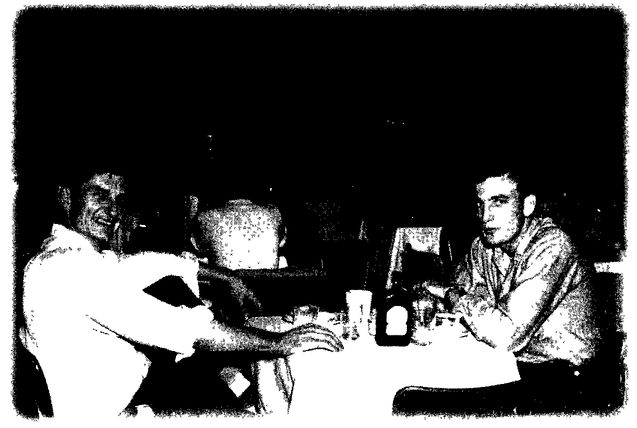
Sitting in a honky-tonk, in a clean white shirt and polished boots, hair slicked back and teeth shining white in a dark tanned face, my uncle is the same man who leans on his knee in another photo, bare arms streaked with dirt, and a cloth cap covering his sweatgrimed brow.
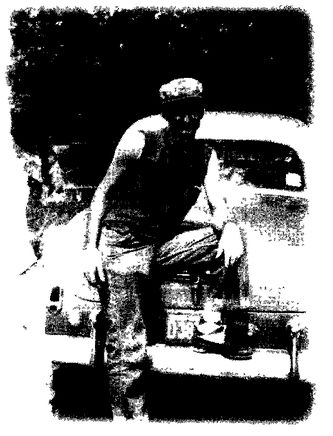
Other books
Down Shift by K. Bromberg
The Last Ride of Caleb O'Toole by Eric Pierpoint
Sea of Lost Love by Santa Montefiore
Wild Magic by Jude Fisher
A Darkness More Than Night by Michael Connelly
Memorizing You by Skinner, Dan
1 Depth of Field by Audrey Claire
There Your Heart Will Be Also by Felicia Rogers
Property Of Drex #2 (Death Chasers MC #2) by C.M. Owens
A Rogue by Any Other Name by Sarah MacLean
